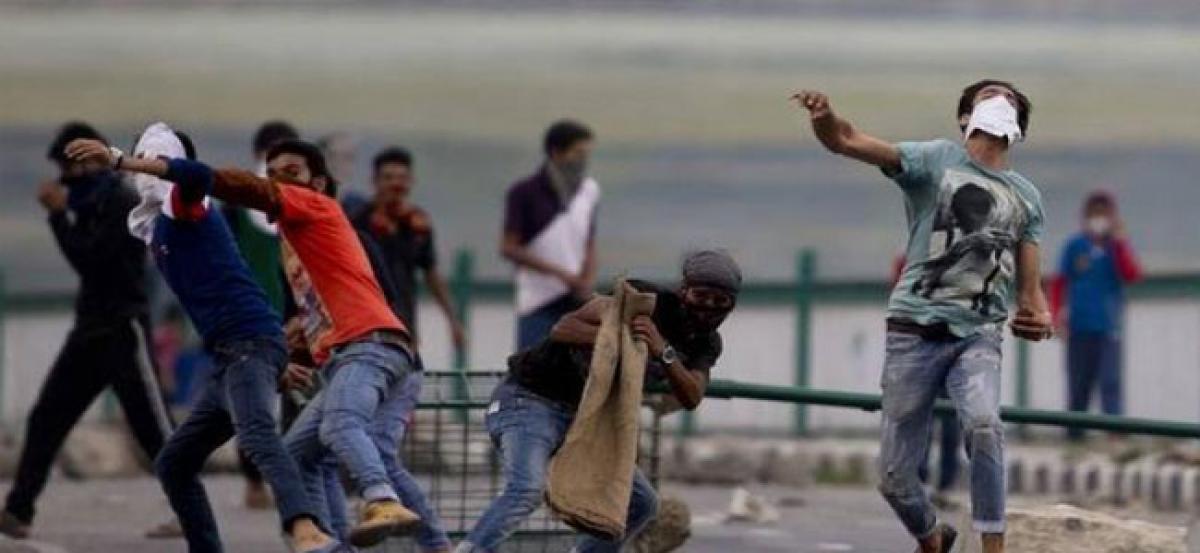Live
- Lok Sabha extends tenure of JPC on Waqf Bill until 2025 Budget Session
- 24 Must-Watch Movies & Web Series This Week: From Thrilling Crime Dramas to Mythological Adventures
- International Seminar held on AI, Educational Communication at EFLU
- Speaker advises ruling and opposition in state assembly
- AAP govt must table 12 CAG reports in Delhi Assembly: BJP
- Raashii Khanna responds to PM Modi's praise for ‘The Sabarmati Report’
- HPZ Token scam: ED attaches Rs 106-cr assets of Chinese entities in India, Dubai
- Telangana: Revanth Reddy Demands Action on Mid-Day Meals Amid Food Poisoning Concerns
- Sensex slumps 1,190 pts, Nifty closes below 24,000
- Delhi sees 1st Japanese Encephalitis case in 13 years: Know all about viral brain infection
Just In
Is India Responsible Enough To Take The Blame: Report On Kashmir To Be A Grave Challenge for Delhi


A first and 49 page ever United Nations report on “Jammu and Kashmir, Azad Kashmir and Gilgit and Baltistan” by the Office of the High Commissioner for Human Rights (OHCHR) took India by surprise last week and fetched an extremely strong reaction from New Delhi.
A first and 49 page ever United Nations report on “Jammu and Kashmir, Azad Kashmir and Gilgit and Baltistan” by the Office of the High Commissioner for Human Rights (OHCHR) took India by surprise last week and fetched an extremely strong reaction from New Delhi. With a three-week session of the 47-member UN Human Rights Council beginning in Geneva on 18 of June, coinciding with the 70th anniversary of the Universal Declaration of Human Rights, an extremely tendentious report focusing on the situation in J&K is bad news.
As of now, India is not a member of the council while Pakistan is till the year 2020. High commissioner Zeid Ra’ad al-Hussein, of the Jordanian ruling family, said “he will urge the Human Rights Council to consider establishing a commission of inquiry to conduct a comprehensive independent international investigation into allegations of human rights violations in Kashmir”. This is a serious challenge for India.
India’s reaction to the report is justified due to its many inaccuracies/ignorance and dependence on the media or other one-sided reports as well as the treatment of UN-listed terrorist outfits like Lashkar-e-Tayyaba/Jamaat-ud-Dawa or Hizbul Mujahideen as “fighters”. But India too needs to be responsible enough to take the blame for adopting, ever since the death of Burhan Wani in July 2016, tactics that have been severely criticised even by Indian commentators and analysts for instance are, the use of pellet guns without properly training the security forces, or specifying their safe range, caused injuries, particularly to the eyes of stone-pelters, disproportionate to the provocation. Although India eventually obtained a sullen peace at the Valley.
The goodwill generated by the relief to the common man by the Ramadan and Id ceasefire announced by the Union government has been negated by the killing of well-known and balanced Kashmiri journalist Shujaat Bukhari as well as Indian soldier Aurangzeb of Kashmiri origin. With the Ramadan period over, the Centre has also called off the ceasefire.
The latest report is, however, Kashmir-specific and looking at the period of July 2016 to end March 2018. The high commissioner’s apparent ire may be due to India’s refusal over the past two years to allow any UN team to visit Jammu and Kashmir for assessment. India has traditionally held that J&K is an internal issue outside the UN’s purview. After 1971, India has not even allowed the United Nations Military Observer Group (UNMOGIP) access, arguing that the Shimla Agreement now defines bilateral dealings.
While the report attempts to appear balanced, criticising Pakistani actions in the parts of Kashmir that it occupies, the real target is clearly India. Strongly condemning the Armed Forces (Special Powers) Act (AFSPA), the report alleges that in the 28 years of its existence “there has not been a single prosecution of armed forces personnel granted by the Central government”. The use of a human shield by Maj. Gogoi, for which he was unwisely given an award by the Army Chief even before an inquiry into the episode was complete, to be seen as an example of overreach by the security forces. The Ajit Doval-Narendra Modi doctrine of “zero tolerance” of terror has indeed hit an international wall by virtue of its purely strongarm approach to counter terrorism.
The Modi government now faces a conundrum as it cannot revert to a pure iron-fisted approach, unaccompanied by a hearts-and–minds outreach, as its actions will be closely watched in Geneva. Nominating a former Intelligence Bureau director as J&K interlocutor proved only partly successful as people want a Donald Trump-type initiative from a much higher level. India must thus change both the substance and the optics of its approach. Prime Minister Modi did not even meet senior statesman Yashwant Sinha, who had before resigning from the BJP in April led an outreach to Kashmiris.
Thus, someone with gravitas is required, as the PDP-BJP alliance has run its course and lacks the moral authority to connect the divide, which would be a condition precedent to any dialogue. Otherwise, the Pakistan Army, will be fully in charge of that country till the elections in July, As they will create provocations in the Valley and along the Line of Control and play the role of a victim at the UN. High commissioner Zeid has fallen for this operatic ploy while the Modi government has been mired in a one-trick Kashmir policy.

© 2024 Hyderabad Media House Limited/The Hans India. All rights reserved. Powered by hocalwire.com






